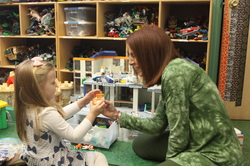Initially developed in the turn of the 20th century, today play therapy refers to a large number of treatment methods, all applying the therapeutic benefits of play. Play therapy differs from regular play in that the therapist helps children to address and resolve their own problems. Play therapy builds on the natural way that children learn about themselves and their relationships in the world around them (Axline, 1947; Carmichael, 2006; Landreth, 2002). Through play therapy, children learn to communicate with others, express feelings, modify behavior, develop problem-solving skills, and learn a variety of ways of relating to others. Play provides a safe psychological distance from their problems and allows expression of thoughts and feelings appropriate to their development.
APT defines play therapy as "the systematic use of a theoretical model to establish an interpersonal process wherein trained play therapists use the therapeutic powers of play to help clients prevent or resolve psychosocial difficulties and achieve optimal growth and development."
APT defines play therapy as "the systematic use of a theoretical model to establish an interpersonal process wherein trained play therapists use the therapeutic powers of play to help clients prevent or resolve psychosocial difficulties and achieve optimal growth and development."
Why Play in Therapy? |
Play therapy is a structured, theoretically based approach to therapy that builds on the normal communicative and learning processes of children (Carmichael, 2006; Landreth, 2002; O'Connor & Schaefer, 1983). The curative powers inherent in play are used in many ways. Therapists strategically utilize play therapy to help children express what is troubling them when they do not have the verbal language to express their thoughts and feelings (Gil, 1991). In play therapy, toys are like the child's words and play is the child's language (Landreth, 2002). Through play, therapists may help children learn more adaptive behaviors when there are emotional or social skills deficits (Pedro-Carroll & Reddy, 2005). The positive relationship that develops between therapist and child during play therapy sessions can provide a corrective emotional experience necessary for healing (Moustakas, 1997). Play therapy may also be used to promote cognitive development and provide insight about and resolution of inner conflicts or dysfunctional thinking in the child (O'Connor & Schaefer, 1983; Reddy, Files-Hall, & Schaefer, 2005).
|
How will Play Therapy Benefit my Child? |
Research supports the effectiveness of play therapy with children experiencing a wide variety of social, emotional, behavioral, and learning problems, including: children whose problems are related to life stressors, such as divorce, death, relocation, hospitalization, chronic illness, assimilate stressful experiences, physical and sexual abuse, domestic violence, and natural disasters (Reddy, Files-Hall, & Schaefer, 2005). Play therapy helps children:
|
